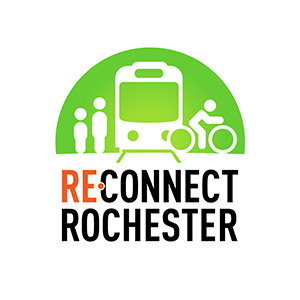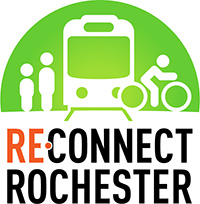by Jesse Peers
Let me get this out of the way: I’m a relatively recent bicycle convert.
I grew up in a cul-de-sac neighborhood way out in the ‘burbs and had nowhere to cycle to as a kid. Seventeen years later living in the City, upon hearing me say it might be nice to have a bike again for some short trips, my uncle gave me a cheap mountain bike he wasn’t using (thanks Gary!). It wasn’t until I caught the excitement surrounding ROC Transit Day and took an urban cycling class at the Rochester Brainery (thanks Tracey!) that I got the confidence I needed to take to the streets and commute to work on a regular basis. When my car died in 2013, it didn’t matter as I had learned to live without one (why had I driven the mile and a half to work every day anyway? Besides, going from two cars to one did wonders for our finances). In 2014 I bought a decent commuting bike and cycling really became a part of my lifestyle. In 2015 I discovered the joy of group rides and started connecting with other cyclists, which led me to getting involved with the Rochester Cycling Alliance this year.
I’ve come to look forward to the third Thursday every month when we get together to talk cycling and brainstorm ways to foster the pedaling revolution in Rochester. I’ve learned a lot from seasoned cyclists and have gotten to meet fiery visiting speakers like Richard Fries. When Fries announced on Twitter in November that MassBike was putting together a Bicycle Advocacy Boot Camp in Boston this month, I knew I wanted to go. So I booked a Greyhound bus and showed up ready to learn December 17th.
The Boot Camp was a wonderful learning experience and each of the speakers had something to offer. When MassBike gets around to having Boot Camp 2.0 (possibly next year), I’d encourage anyone interested in cycling to make the trip. Here are some brief takeaways (some of which we’ll discuss in January’s meeting):
- Rochester has a substantial biking community but the community is disparate. We’ve got a plethora of organizations and initiatives and we need to work closer together, know what each other is doing and present a united front to City officials. I can see why newcomers to the area or new cyclists are overwhelmed: We’ve got the Rochester Cycling Alliance, R Community Bikes, Reconnect Rochester, Rochester Bicycling Club, Conkey Cruisers, Unity Ride, Spokes & Folks, Spokes & Ink Festival, Kidical Mass Pittsford, Bike-In-Movies at the Market, Bicycle Film Fest, Rochester Bike Kids, City-sponsored Tuesday rides in the summer, not to mention the wonderful bike shops scattered throughout the area. (And that’s just the road bikers. Mountain bikers have their own niche).
- Rochester’s comparably small size is an asset. Whereas it became apparent cyclists from the Brookline, Waltham, Somerville, Weymouth, Newton, Medford, and Mattapan areas around Boston all dealt with very different issues and had considerable and disconnected distance between them, Rochester’s a City where virtually everything is within five miles (a half-hour). If we work together, we can create the City we want and make cycling a normal, economically-freeing, viable, safe form of transportation for everybody.
- For decades, bicycle advocacy has been geared toward older white males. This needs to change. The RCA needs people of color, women and young people to give us the inertia and representation we need. We all cycle for different reasons and we need to learn from your experiences.
- As I have gotten involved with the RCA, I saw our mission as twofold: 1) Advocacy and 2) Fostering a cycling culture. MassBike’s boot camp woke me up to a 3rd role: Education. Politicians, citizens, drivers, cyclists – all have something to learn. (I also began to wonder what it would take to get local elementary schools to teach cycling skills and safety).
- The overwhelming majority of boot camp attendees (it was Boston after all) were still reeling from the November election. One of the big questions for those passionate about cycling, new urbanism, safer streets, public transit and sustainability was what we can expect now at the Federal level. Though we’re certain to have our work cut out for us, we took heart that most decisions about transit, parking, development, zoning and infrastructure are made at the local level. Make your voice heard.
- As Richard Fries told us, “Nothing in government moves without being pushed.” We need to be tactful and polite but ultimately relentless.
So this blog entry is an open invitation to get involved. Keep an eye on our calendar for upcoming meetings and events and please come to our monthly meetings. You’ve got a place at the table.

